arthritis support
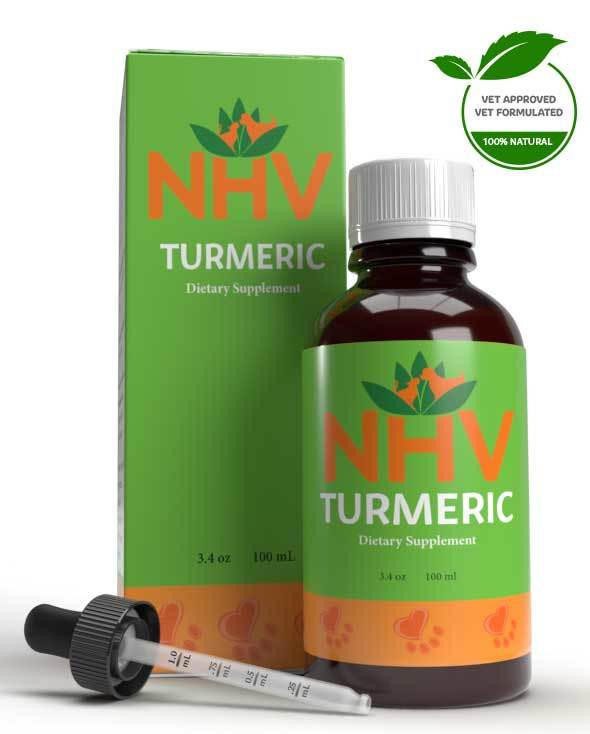
free shipping over $100 (USA & Canada)
1-877-937-4372 the pet expert hotline

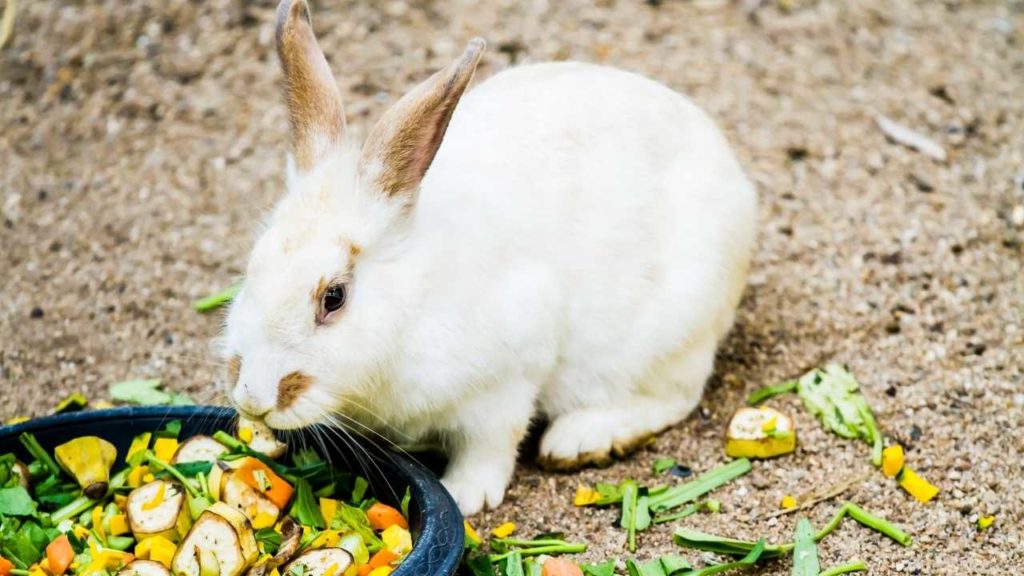
Easter is just around the corner and we can’t think of a better way to celebrate but to talk about RABBITS! Sure they are the first pets we can think of when it comes to the holiday, but did you know that their diets can be very specific and involve more than just carrots?
The recommended rabbit’s diet is high in fiber and relatively low in calories.
A good mix of pellets, hay, vegetables, as well as freshwater will make your rabbit’s diet delicious, nutritive and will give a healthy life for your bunny. The recommended rabbit’s diet is high in fiber and relatively low in calories. Our pet experts put together a guide for a rabbit’s diet to help pet parents keep these fluffy ones healthy and strong!
The maintenance amount that is recommended is no more than 1/8 cup per 4 lbs. of body weight of a high fiber maintenance type pellet (18% or higher fiber) per day. In young growing animals the pellets may be given free choice until they are about 6-8 months of age.
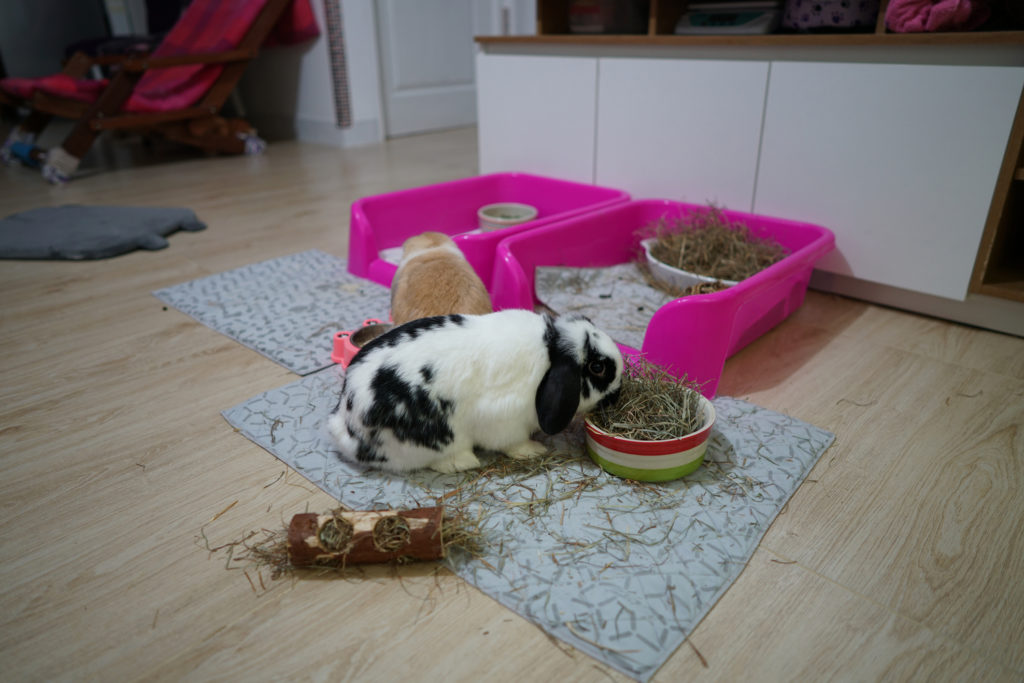
Hay needs to be fresh and available at all times. Mixed grass hay or timothy hay is the preferred type because it is lower in calcium and calories than alfalfa hay. It is also important to store hay in a dry place in a container that allows airflow to keep it from getting moldy.
It is interesting to feed a minimum of 3 different types of fibrous greens daily. The minimum amount recommended per day is 1 heaping cup/4 lbs. body weight. Some of the good greens are:
Other vegetables such as pea pods (not the peas), green pepper and squash, can also be fed.
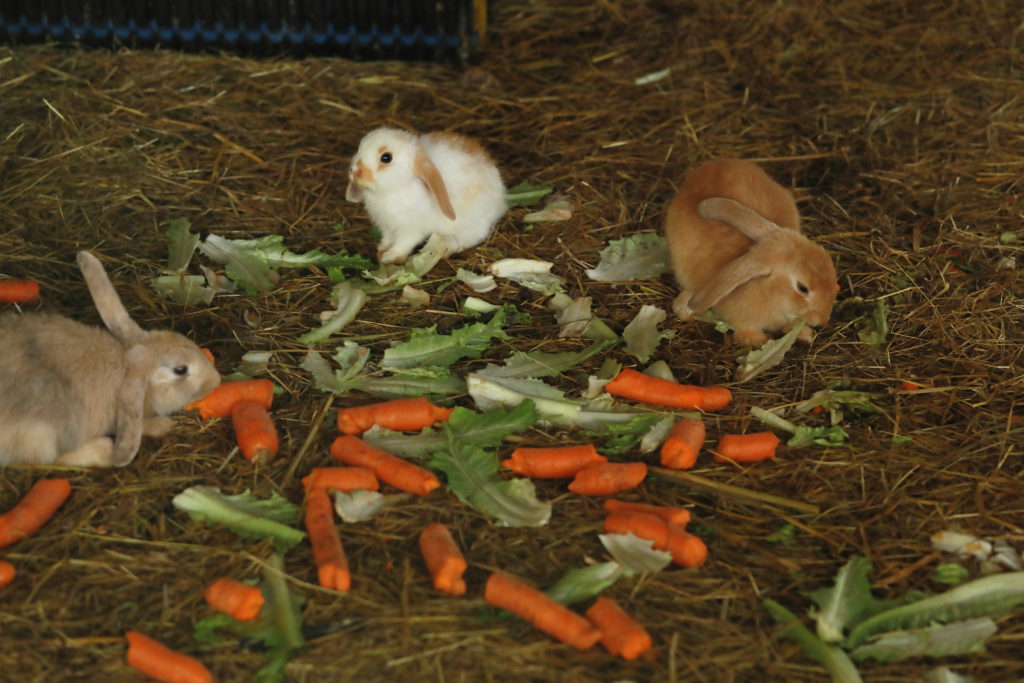
Fruits can also be fed with some restrictions. Prefer high fiber fruits such as apples, pears, peaches, papaya, pineapple, and strawberries, but stay away from sugary fruits such as bananas and grapes.
Freshwater must always be available to your rabbit, and on hot days, you can drop an ice cube or two in your rabbit’s water dish.
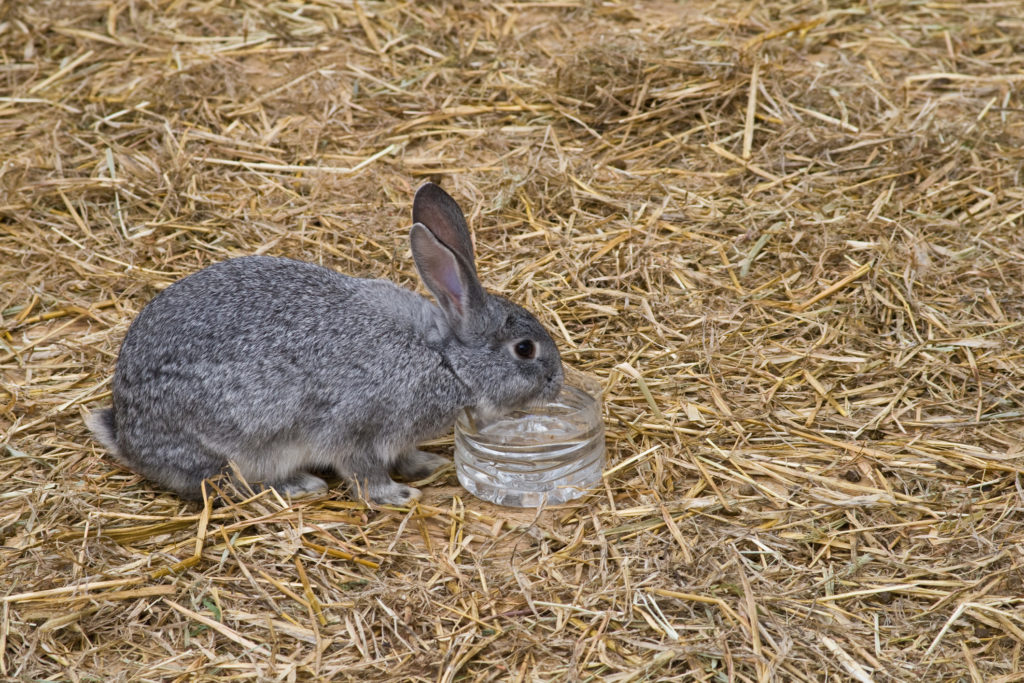
Cecotropes is a kind of rabbit poop produced by the cecum that contains around 28-30% crude protein, up to 30% of the nitrogen, some fatty acids, microorganism protein, B vitamins, sodium, water, lysine, threonine, potassium, and suffer amino acids. It is not commonly seen because the rabbits eat it directly from their anus. However, if the rabbit has health or dietary issues the owner can see it.
It is very important to pay attention to the cecotropes of your rabbits, as it is an important part of their diet. Cecotropes helps with the nutrition of the rabbits, it is an additional source of energy, B vitamins, and aid in the replenishment of cecal microflora.
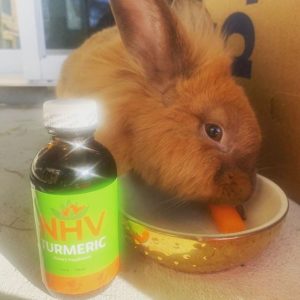
In addition to the diet we suggested above, your furkiddo can take Turmeric as proactive care. You can mix it with their food, twice daily. The active compound in turmeric is curcumin. Studies have shown turmeric to be an excellent anti-inflammatory, antioxidant, antifungal, antibacterial, anticoagulant, antiseptic, astringent, helps with liver function, bile production, and externally for wound healing. The healing properties of curcumin may also be beneficial for rabbits with autoimmune diseases, liver disorders, heart, and circulatory support.
NHV Turmeric is also beneficial for arthritic conditions in rabbits due to its anti-inflammatory properties and is COX2 inhibitor. The use of turmeric extracts in a rabbit’s daily diet may help scavenge free radicals, increase antioxidant enzymes, and inhibit lipid peroxidation.
arthritis support

Healthy Aging and Cancer Support
bundle and save with pet expert kits
3-6 month supply
Rabbits are special pets. They are playful, silly, and full of personality. To help keep these goofballs in good health, turmeric supplements can be a part of rabbit care. Turmeric is one of the most well-known rabbit supplements, offering your bunny anti-inflammatory support naturally.
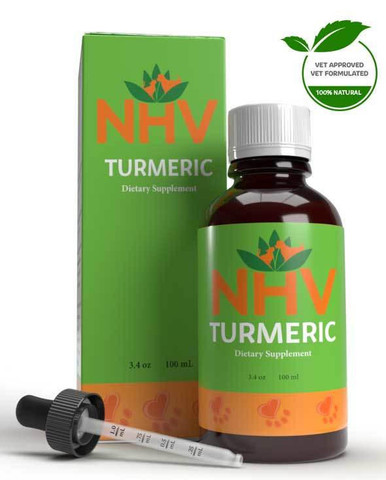
Rabbits are special pets. They are playful, silly, and full of personality. To help keep these goofballs in good health, turmeric supplements can be a part of rabbit care. Turmeric is one of the most well-known rabbit supplements, offering your bunny anti-inflammatory support naturally.
Rabbits are so cute, and rabbit parents know they have just as much personality as cats or dogs. To be proactive for their health, you can use Turmeric with these twitchy-nosed fur-babies for general and proactive health, as well as for a number of conditions and diseases.
Of all our rabbit supplements, our natural turmeric formula has some of the best anti-inflammatory properties. It can help with a number of health concerns that rabbits are prone to, including cancers, arthritis, and inflammation-related diseases.
We especially love turmeric as a proactive measure because rabbit care is all about setting up your big-eared family member up for whatever challenges they may face.
Turmeric is one of the most well-known natural remedies, and holistic vets have used it for quite a while. To understand why turmeric can be used as a rabbit supplement, we can dive into just how this orange spice called turmeric can help.
Rabbits that are sick may have increased oxidation, and antioxidants from natural sources like those found in turmeric can help give them a boost when they need it. Thanks to its anti-inflammatory possibilities, it may even help them feel better, too.
Natural rabbit care is growing more and more popular. Holistic vets believe that several factors can contribute to healthy outcomes, like lifestyle, diet, and supplements. We are proud that many vets offer our supplements, including Turmeric, in their offices because of its high standards of quality. That’s because our Turmeric is:
Wondering why turmeric is such a powerful natural supplement for pets? Our Pet Experts explain it all in this guide on why you should give your pet turmeric, and many pet parents have had success using NHV Turmeric for their pet wellness goals.
All NHV supplements are made with the finest quality organic or ethically harvested herbs. We use non-GMO vegetable glycerin as our base. NHV products are full-spectrum extracts.
Select your pet's weight to determine the correct dose.
For rabbits: 0.5ml twice daily.
How to Administer
Shake well before use. The easiest method is to use the dropper provide and places the drops into your pet’s food or favorite treat. You can also use the dropper and squirt directly into the pet’s mouth.
Some pets can be finicky, if this occurs consider hiding the drops in foods most pet’s love such as fish, chicken or yogurt or a favorite treat. If your pet only eats dry food then soak a few kibbles at feeding time.
For Best Results
Herbal dietary supplements are beneficial to the health and wellbeing of your pet and are safe for long-term use. Every pet responds to natural herbal supplements differently, therefore it is important to be consistent and administer the product daily. Supplements generally take two to four weeks to take effect, however this will vary from one animal to the next.
Product Storage
All NHV Natural Pet Products are pure herbal extracts and contain no artificial additives, preservatives or coloring. Shelf life after opening is 6 months and must be refrigerated after opening.
Cautions and Contraindications: Do not use Turmeric in pregnant or nursing animals. Speak to your vet before using our products. A second visit is recommended if your pet’s condition does not improve, or deteriorates after continued use of the supplements.
Rabbits are so cute, and rabbit parents know they have just as much personality as cats or dogs. To be proactive for their health, you can use Turmeric with these twitchy-nosed fur-babies for general and proactive health, as well as for a number of conditions and diseases.
Of all our rabbit supplements, our natural turmeric formula has some of the best anti-inflammatory properties. It can help with a number of health concerns that rabbits are prone to, including cancers, arthritis, and inflammation-related diseases.
We especially love turmeric as a proactive measure because rabbit care is all about setting up your big-eared family member up for whatever challenges they may face.
Turmeric is one of the most well-known natural remedies, and holistic vets have used it for quite a while. To understand why turmeric can be used as a rabbit supplement, we can dive into just how this orange spice called turmeric can help.
Rabbits that are sick may have increased oxidation, and antioxidants from natural sources like those found in turmeric can help give them a boost when they need it. Thanks to its anti-inflammatory possibilities, it may even help them feel better, too.
Natural rabbit care is growing more and more popular. Holistic vets believe that several factors can contribute to healthy outcomes, like lifestyle, diet, and supplements. We are proud that many vets offer our supplements, including Turmeric, in their offices because of its high standards of quality. That’s because our Turmeric is:
Wondering why turmeric is such a powerful natural supplement for pets? Our Pet Experts explain it all in this guide on why you should give your pet turmeric, and many pet parents have had success using NHV Turmeric for their pet wellness goals.
All NHV supplements are made with the finest quality organic or ethically harvested herbs. We use non-GMO vegetable glycerin as our base. NHV products are full-spectrum extracts.
Select your pet's weight to determine the correct dose.
For rabbits: 0.5ml twice daily.
How to Administer
Shake well before use. The easiest method is to use the dropper provide and places the drops into your pet’s food or favorite treat. You can also use the dropper and squirt directly into the pet’s mouth.
Some pets can be finicky, if this occurs consider hiding the drops in foods most pet’s love such as fish, chicken or yogurt or a favorite treat. If your pet only eats dry food then soak a few kibbles at feeding time.
For Best Results
Herbal dietary supplements are beneficial to the health and wellbeing of your pet and are safe for long-term use. Every pet responds to natural herbal supplements differently, therefore it is important to be consistent and administer the product daily. Supplements generally take two to four weeks to take effect, however this will vary from one animal to the next.
Product Storage
All NHV Natural Pet Products are pure herbal extracts and contain no artificial additives, preservatives or coloring. Shelf life after opening is 6 months and must be refrigerated after opening.
Cautions and Contraindications: Do not use Turmeric in pregnant or nursing animals. Speak to your vet before using our products. A second visit is recommended if your pet’s condition does not improve, or deteriorates after continued use of the supplements.
liver support
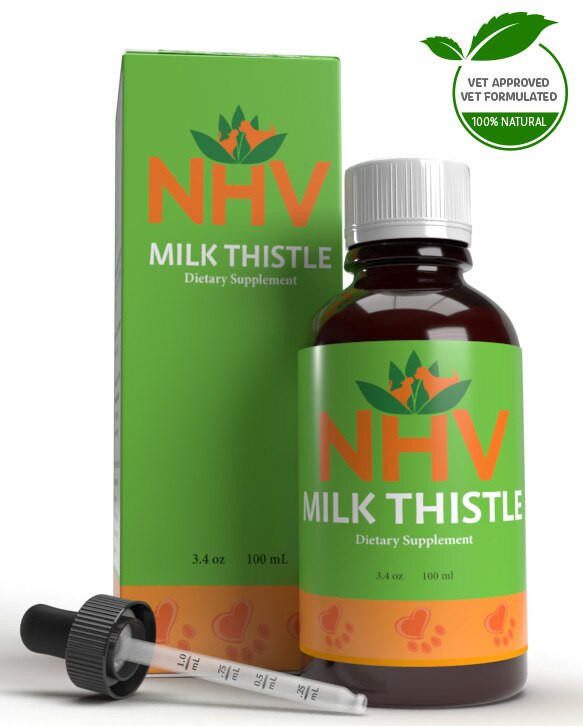
Natural Pet Rabbit Liver Support
buy 2 and save $3
3 month supply for a small to medium size pet
The liver filters anything that your furkiddo puts into their body. So when your pet is sick, toxins may build up in the body and have a tough time getting out. NHV Milk Thistle is a natural supplement for rabbits that helps the liver remove metabolic wastes, and helps to restore immune function as well.


The liver filters anything that your furkiddo puts into their body. So when your pet is sick, toxins may build up in the body and have a tough time getting out. NHV Milk Thistle is a natural supplement for rabbits that helps the liver remove metabolic wastes, and helps to restore immune function as well.

If your pet is battling an illness such as cancer, or kidney disease, the buildup of toxins in their body may be affecting their liver and kidney function. This buildup of toxins often weakens the immune system as well. Milk Thistle contains the active compound silymarin, which helps detoxify the liver and helps support, strengthen and regenerate liver tissue. Research has shown that Milk Thistle may also improve kidney function.
Milk Thistle contains the active compound silymarin which has been used for thousands of years for its numerous health benefits. Studies have shown that silymarin contains effective anti-inflammatory, antioxidant, and detoxifying properties to promote regeneration and repair. Also known as wild artichoke and holy thistle, Milk Thistle is beneficial for removing toxins and metabolic wastes that may accumulate due to illness. Studies are also showing that Milk thistle may have anti-cancer properties due to its high concentration of free radical scavengers.
We know your bunnies are your family. That’s why we made our natural supplements for rabbits 100% natural, easy to administer (liquid formula) and made with only the best organic or wild-crafted, plant-based ingredients. For any questions or concerns about your furkiddo’s liver or kidney health, don’t hesitate to get in touch with an NHV Pet Expert - we’re always here to help!.
Made with the finest, organically grown, or ethically harvested herbs. Made specifically for pets, vet-formulated and vet approved.
Select your pet's weight to determine the correct dose.
For rabbits: 0.5ml (12 drops) twice daily.
How to Administer
Shake well before use. The easiest method is to use the dropper provide and places the drops into your pet’s food or favorite treat. You can also use the dropper and squirt directly into the pet’s mouth.
Some pets can be finicky, if this occurs consider hiding the drops in foods most pet’s love such as mashed banana, strawberry or another favorite treat.
For Best Results
Herbal dietary supplements are beneficial to the health and wellbeing of your pet and are safe for long-term use. Every pet responds to natural herbal supplements differently, therefore it is important to be consistent and administer the product daily. Supplements generally take two to four weeks to take effect, however this will vary from one animal to the next.
Product Storage
All NHV Natural Pet Products are pure herbal extracts and contain no artificial additives, preservatives or coloring. Shelf life after opening is 6 months and must be refrigerated after opening.
Cautions and Contraindications
Do not use Milk Thistle in pregnant or nursing animals. Speak to your vet before using our products. A second visit is recommended if your pet’s condition does not improve, or deteriorates after continued use of the supplements.
All information provided by NHV Natural Pet Products is for educational purposes only.
If your pet is battling an illness such as cancer, or kidney disease, the buildup of toxins in their body may be affecting their liver and kidney function. This buildup of toxins often weakens the immune system as well. Milk Thistle contains the active compound silymarin, which helps detoxify the liver and helps support, strengthen and regenerate liver tissue. Research has shown that Milk Thistle may also improve kidney function.
Milk Thistle contains the active compound silymarin which has been used for thousands of years for its numerous health benefits. Studies have shown that silymarin contains effective anti-inflammatory, antioxidant, and detoxifying properties to promote regeneration and repair. Also known as wild artichoke and holy thistle, Milk Thistle is beneficial for removing toxins and metabolic wastes that may accumulate due to illness. Studies are also showing that Milk thistle may have anti-cancer properties due to its high concentration of free radical scavengers.
We know your bunnies are your family. That’s why we made our natural supplements for rabbits 100% natural, easy to administer (liquid formula) and made with only the best organic or wild-crafted, plant-based ingredients. For any questions or concerns about your furkiddo’s liver or kidney health, don’t hesitate to get in touch with an NHV Pet Expert - we’re always here to help!.
Made with the finest, organically grown, or ethically harvested herbs. Made specifically for pets, vet-formulated and vet approved.
Select your pet's weight to determine the correct dose.
For rabbits: 0.5ml (12 drops) twice daily.
How to Administer
Shake well before use. The easiest method is to use the dropper provide and places the drops into your pet’s food or favorite treat. You can also use the dropper and squirt directly into the pet’s mouth.
Some pets can be finicky, if this occurs consider hiding the drops in foods most pet’s love such as mashed banana, strawberry or another favorite treat.
For Best Results
Herbal dietary supplements are beneficial to the health and wellbeing of your pet and are safe for long-term use. Every pet responds to natural herbal supplements differently, therefore it is important to be consistent and administer the product daily. Supplements generally take two to four weeks to take effect, however this will vary from one animal to the next.
Product Storage
All NHV Natural Pet Products are pure herbal extracts and contain no artificial additives, preservatives or coloring. Shelf life after opening is 6 months and must be refrigerated after opening.
Cautions and Contraindications
Do not use Milk Thistle in pregnant or nursing animals. Speak to your vet before using our products. A second visit is recommended if your pet’s condition does not improve, or deteriorates after continued use of the supplements.
All information provided by NHV Natural Pet Products is for educational purposes only.
kidney & bladder support
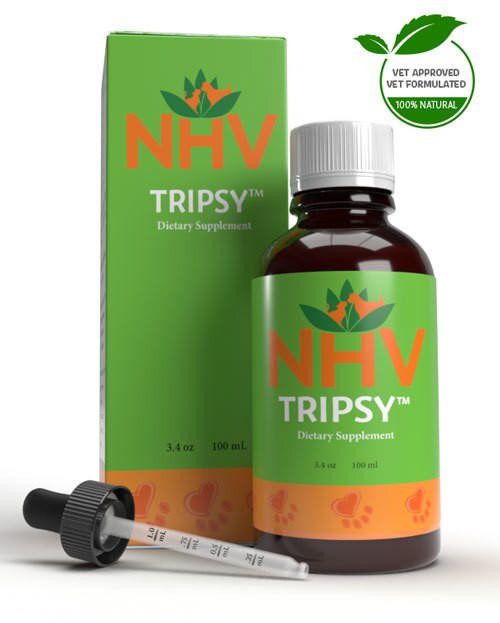
Holistic Rabbit Kidney Supplement
buy 2 and save $3
3-6 Month supply
Just like humans, pet rabbits can develop kidney problems. Some common symptoms of rabbit kidney problems are straining to urinate, more frequent urination, and inappropriate urination. NHV Tripsy™ is an all-natural plant-based rabbit kidney supplement that helps support the kidneys and bladder to encourage healthy urinary and kidney health.

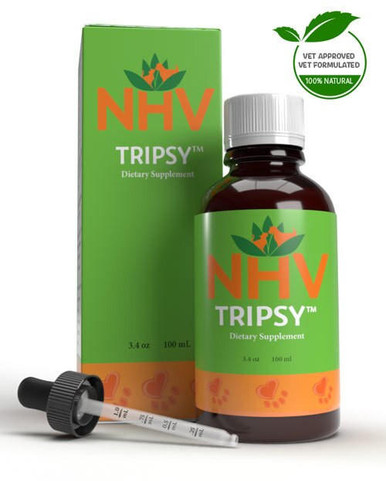
Just like humans, pet rabbits can develop kidney problems. Some common symptoms of rabbit kidney problems are straining to urinate, more frequent urination, and inappropriate urination. NHV Tripsy™ is an all-natural plant-based rabbit kidney supplement that helps support the kidneys and bladder to encourage healthy urinary and kidney health.

Holistic Rabbit Kidney Supplement Support
Sometimes it can be tricky to tell what is bothering your furry companion, because no two pets are alike! But a common health issue that affects our bunny pals is kidney disease. These two bean-shaped organs have several key roles: removing metabolic wastes from the body and maintaining the correct balance of water and electrolytes (salts) within the body. Another important role is producing essential hormones that help maintain healthy blood pressure, production of new blood cells, and allow the body to absorb salt. Lastly, the urinary system processes vitamin D - an integral component for calcium absorption and bone growth.
The two most common types of renal issues are kidney degeneration (often age-related) which can lead to organ failure and acute kidney failure, where symptoms develop suddenly over a few days or weeks and can lead to the kidneys shutting down quickly. This may cause irregularities in your bunny’s urinary output. To figure out if your furkiddo has kidney issues, your vet can run some tests like bloodwork, urinalysis, radiographs, ultrasounds, and/or CT scans, to further investigate their symptoms. The typical course of action for rabbit kidney problems includes intravenous fluid therapy (under the supervision of your trusted vet), the addition of glycoproteins and a kidney-specific, balanced diet.
Symptoms of Rabbit Kidney Problems
For kidney degeneration or acute kidney issues, we'd suggest adding a natural rabbit kidney supplement like NHV Tripsy™ to your bunny's daily feeding schedule. It can safely be used short-term as well as long-term as a natural health support. Tripsy™ promotes healthy kidney, bladder, and urinary tract functions and may eliminate kidney stone formation in all of your bunny pals (both young and old).
How NHV’s Supplements Ease Rabbit Kidney Problems
Kidney issues can cause a lot of stress and worry in your Lop and Lionhead pals. Ingredients like parsley piert and stone root have diuretic properties that gently regulate urine flow, if on the low/infrequent side, to help keep things flowing normally and prevent the formation of kidney and bladder calculi (often called stones). Herbs like Wild hydrangea and Gravel root have traditionally been used for supporting kidney and urinary health by helping to break down, dissolve and remove stones and prevent urinary tract infections (UTIs). Other ingredients like Echinacea purpurea and Oregon grape's defense against microorganisms help combat infections. And lastly, Marshmallow soothes irritated internal tissues and protects cells from oxidative damage.
Causes for Kidney Issues in Rabbits
Help your Rabbit Bounce Back from Rabbit Kidney Problems Naturally
Part of being a pet parent is doing everything you can to support your furkiddo. NHV Natural Pet Products are plant-based and their liquid formulations make them easy to hide in food so getting them to take their daily dose is a total breeze. If you ever feel like you need an extra hand (or paw) when it comes to kidney problems in rabbits, our team of vets and pet experts is always here to help you. Click the button below to get started!
Made with the finest, organically grown, or ethically harvested herbs. Made specifically for pets, vet-formulated and vet approved.
Tripsy™ for Rabbit Kidney Support
For Rabbits: 0.5ml twice daily
How to Administer
Shake well before use. The easiest method is to use the dropper provide and places the drops into your pet’s food or favorite treat. You can also use the dropper and squirt directly into the pet’s mouth.
Some pets can be finicky, if this occurs consider hiding the drops in foods most pet’s love such as mashed banana, strawberry or another favorite treat.
For Best Results
Herbal dietary supplements are beneficial to the health and wellbeing of your pet and are safe for long-term use. Every pet responds to natural herbal supplements differently, therefore it is important to be consistent and administer the product daily. Supplements generally take two to four weeks to take effect, however this will vary from one animal to the next.
Product Storage
All NHV Natural Pet Products are pure herbal extracts and contain no artificial additives, preservatives or coloring. Shelf life after opening is 6 months and must be refrigerated after opening.
Cautions and Contraindications
Do not use Tripsy if your pet is pregnant. No known side effects. Speak to your vet before using our products. A second visit is recommended if your pet’s condition does not improve, or deteriorates after continued use of the supplements.
All information provided by NHV Natural Pet Products is for educational purposes only.
Holistic Rabbit Kidney Supplement Support
Sometimes it can be tricky to tell what is bothering your furry companion, because no two pets are alike! But a common health issue that affects our bunny pals is kidney disease. These two bean-shaped organs have several key roles: removing metabolic wastes from the body and maintaining the correct balance of water and electrolytes (salts) within the body. Another important role is producing essential hormones that help maintain healthy blood pressure, production of new blood cells, and allow the body to absorb salt. Lastly, the urinary system processes vitamin D - an integral component for calcium absorption and bone growth.
The two most common types of renal issues are kidney degeneration (often age-related) which can lead to organ failure and acute kidney failure, where symptoms develop suddenly over a few days or weeks and can lead to the kidneys shutting down quickly. This may cause irregularities in your bunny’s urinary output. To figure out if your furkiddo has kidney issues, your vet can run some tests like bloodwork, urinalysis, radiographs, ultrasounds, and/or CT scans, to further investigate their symptoms. The typical course of action for rabbit kidney problems includes intravenous fluid therapy (under the supervision of your trusted vet), the addition of glycoproteins and a kidney-specific, balanced diet.
Symptoms of Rabbit Kidney Problems
For kidney degeneration or acute kidney issues, we'd suggest adding a natural rabbit kidney supplement like NHV Tripsy™ to your bunny's daily feeding schedule. It can safely be used short-term as well as long-term as a natural health support. Tripsy™ promotes healthy kidney, bladder, and urinary tract functions and may eliminate kidney stone formation in all of your bunny pals (both young and old).
How NHV’s Supplements Ease Rabbit Kidney Problems
Kidney issues can cause a lot of stress and worry in your Lop and Lionhead pals. Ingredients like parsley piert and stone root have diuretic properties that gently regulate urine flow, if on the low/infrequent side, to help keep things flowing normally and prevent the formation of kidney and bladder calculi (often called stones). Herbs like Wild hydrangea and Gravel root have traditionally been used for supporting kidney and urinary health by helping to break down, dissolve and remove stones and prevent urinary tract infections (UTIs). Other ingredients like Echinacea purpurea and Oregon grape's defense against microorganisms help combat infections. And lastly, Marshmallow soothes irritated internal tissues and protects cells from oxidative damage.
Causes for Kidney Issues in Rabbits
Help your Rabbit Bounce Back from Rabbit Kidney Problems Naturally
Part of being a pet parent is doing everything you can to support your furkiddo. NHV Natural Pet Products are plant-based and their liquid formulations make them easy to hide in food so getting them to take their daily dose is a total breeze. If you ever feel like you need an extra hand (or paw) when it comes to kidney problems in rabbits, our team of vets and pet experts is always here to help you. Click the button below to get started!
Made with the finest, organically grown, or ethically harvested herbs. Made specifically for pets, vet-formulated and vet approved.
Tripsy™ for Rabbit Kidney Support
For Rabbits: 0.5ml twice daily
How to Administer
Shake well before use. The easiest method is to use the dropper provide and places the drops into your pet’s food or favorite treat. You can also use the dropper and squirt directly into the pet’s mouth.
Some pets can be finicky, if this occurs consider hiding the drops in foods most pet’s love such as mashed banana, strawberry or another favorite treat.
For Best Results
Herbal dietary supplements are beneficial to the health and wellbeing of your pet and are safe for long-term use. Every pet responds to natural herbal supplements differently, therefore it is important to be consistent and administer the product daily. Supplements generally take two to four weeks to take effect, however this will vary from one animal to the next.
Product Storage
All NHV Natural Pet Products are pure herbal extracts and contain no artificial additives, preservatives or coloring. Shelf life after opening is 6 months and must be refrigerated after opening.
Cautions and Contraindications
Do not use Tripsy if your pet is pregnant. No known side effects. Speak to your vet before using our products. A second visit is recommended if your pet’s condition does not improve, or deteriorates after continued use of the supplements.
All information provided by NHV Natural Pet Products is for educational purposes only.
Published: April 7, 2020
7 replies
My rabbit has infection in her right eye and she is turning blind. How can she get rid of the infection. It was a small white dot and now that white has covered her entire eye. Pls suggest.
Hi Meenal,
Thank you so much for reaching out to us! We can’t imagine how stressful this must be for you, so thank you for looking out for your little one when she needs you most.
We have a few suggestions that we think could help your sweet girl:
First, we’d recommend Ey-Eas. This is our main eye support that we only suggest using if your little one doesn’t have any ulcers or tears in her eye. Ey-Eas can help to naturally manage swelling, restore eyes back to their natural state, and can help prevent spreading eye infections to other kitties. You can click here to learn more about Ey-Eas: https://www.nhvnaturalpetproducts.com/ey-eas-for-eye-infections-in-cats
Next, we’d suggest Turmeric. This powerful yet gentle supplement can help to reduce inflammation and discomfort. Here’s more on Turmeric: https://www.nhvnaturalpetproducts.com/turmeric-for-rabbits/
Please feel free to reach out to us any time you need us, our team is always here if you ever need anything.
Wishing you and your bun all the best!
Yours in wellness,
Team NHV
Hi Lily,
We can’t imagine how uncomfortable your little one must be. Thank you so much for looking out for your sweet boy, especially when he needs you most.
We spoke with our vet team for you and they have a few suggestions that they think could help keep your bunny as comfortable as possible.
First, we’d recommend Tripsy as this is our main kidney and URI support. The unique blend of herbs found in Tripsy can help to maintain kidney health and urinary tract health, soothe discomfort, all while helping to reduce inflammation.
Here’s more information on Tripsy for you: https://www.nhvnaturalpetproducts.com/tripsy-for-rabbits/
Second, we would suggest our Turmeric supplement to help get the uncomfortable inflammation down. Turmeric can also help to support kidney health while supporting other important organs like the heart.
Here’s more on Turmeric for you: https://www.nhvnaturalpetproducts.com/turmeric-for-rabbits/
Next, we’d recommend Stimmune to help with supporting your little one’s immune system. Stimmune can help to reduce uncomfortable symptoms like itchiness and inflamed skin while helping to fight off infection.
Click here for more on Stimmune: https://www.nhvnaturalpetproducts.com/stimmune-for-cat-allergy-relief-feline-immune-support
Lastly, because your little guy is on antibiotics, which can be tough on a pet’s body (especially the liver) we would suggest our Milk Thistle supplement. This powerful supplement can help to support liver health, and liver regeneration while also helping to detoxify the liver and kidneys.
Here’s more on Milk Thistle: https://www.nhvnaturalpetproducts.com/milk-thistle-for-rabbits/
Because your little one has had nystagmus, we would strongly suggest speaking with your veterinarian before taking him off of antibiotics.
We know that this is a lot of information to take in, so please take your time in reviewing everything. Feel free to pass this info along to your vet as well and don’t forget we’re always here if you have any questions at all!
Sending you and your little one lots of love and good vibes!
Yours in wellness,
Team NHV
When a matured female rabbit could not conceive after several breeding what could be the cause and the cure.
Hi Tahyor,
We are so sorry to hear about your little one’s condition. There are many reasons for a rabbit to not get conceived, such as old age, underlying diseases, stress, injuries, or lack of nutrition. We suggest bringing your rabbit to an exotic veterinarian to find out the cause. Once diagnosed, we can help guide you through our supplements that may further help support your little one’s quality of life.
We hope all the best for your rabbit. Please do let us know if you have any questions.
Yours in wellness,
Team NHV
Can my 4 lb rabbit eat turmeric root that I grow in my garden? If so, how much should I give her?
Hi Shirley,
Thanks so much for reaching out to us!
That’s a great question! While turmeric can be very beneficial to our furkiddos, it’s vital that they’re given turmeric, and other herbs, in pet-formulated dosages. Just like the saying says, “too much of a good thing, isn’t always a good thing.” So we would not recommend giving your rabbit turmeric root from your garden.
Good news, though! We have vet-formulated and pet-safe Turmeric! This powerful yet gentle supplement can help to reduce inflammation, support muscles and joints, and can help to support vital organs like the heart and liver.
More information on Turmeric here: https://www.nhvnaturalpetproducts.com/turmeric-for-rabbits/
We also thought you might like to check out our blog on Turmeric and why it can be so beneficial for our little ones! https://nhvpethealth.com/blog/vet-talks-superherb-turmeric-and-its-uses-for-pet-health/
Sending lots and lots of love to you and your little bunny!
Please feel free to reach out to us at any time.
Yours in wellness,
Team NHV